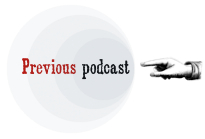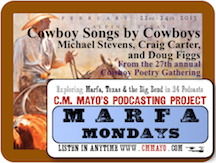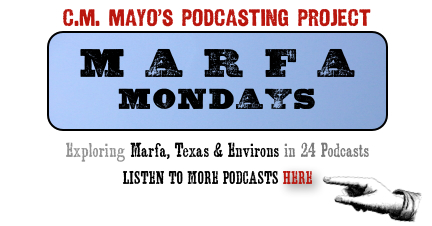|
Author of The Last Prince of the Mexican Empire, etc. |
|
|

|

|

|
|
COWBOY SONGS BY COWBOYS AND AN INTERVIEW WITH MICHAEL STEVENS |
|||
 |
|||
|
(APPROX 50 MINUTES) |
|||
|
|
|||
|
Announcer: Welcome to Marfa Mondays with your host, C.M. Mayo [MUSIC] C.M. Mayo: Cowboy songs by Michael Stevens, Craig Carter and Doug Figgs and an interview with Michael Stevens. This is number 11 in the 24 podcast series "Marfa Mondays," exploring Marfa, Texas and the Big Bend 2012 to 2013, which is apropos of my book-in-progress about Far West Texas. It looks like the title is going to be World Waiting for a Dream: A Turn in Far West Texas, and I invite you to read more about that book and my several other books, and to listen in to all the other Marfa Mondays podcasts anytime on my website www.cmmayo.com. This podcast was recorded on February 23, 2013, and by permission of the artists, at the 27th annual Cowboy Poetry Gathering at Sul Ross State University in Alpine, Texas. First up, accompanied by Zac Casey, is Michael Stevens of Alpine, Texas. Yes, those of you who know guitars, this is the Michael Stevens, one of the world's finest builders of electric stringed instruments. His appearance at the Cowboy Poetry Gathering was sponsored by the Penitas Ranch and Ira Blanton, Jr. Michael Stevens... Michael Stevens:
[SINGING "THE
OLD DOUBLE DIAMOND"] C.M. Mayo: That was Michael Stevens. Next up, Craig Carter. A singer and songwriter who ranches south of Marathon, Texas. Craig Carter has also worked as a wrangler and stunt man for several movies filmed in Marfa and the Big Bend area, including "The Three Burials of Melquiades Estrada," "No Country for Old Men," and "The Legend of Hell's Gate." His participation in the Cowboy Poetry Gathering was sponsored by West Texas National Bank. The song you're about to hear him sing is called "Crossing Jordan." As Carter describes it, "it's about a young guy who gets into a jam and an older guy gets after him," and the lyrics give the alternating points of view. Craig Carter: [SINGING "CROSSING JORDAN"] C.M. Mayo: Next up is Doug Figgs, who traveled all the way from Lemitar, New Mexico where, apart from working as a singer and songwriter and raising a few cows and horses, he runs a full-time farrier business. What does a farrier do? Trim and shoe horses' hooves. Doug Figgs' participation in the Cowboy Poetry Gathering was sponsored by the Maverick Inn and the Century Bar and Grill. Doug Figgs: Last year of 2012 was a centennial year for the state of New Mexico, so I wrote this song for that, to celebrate that. We played it on New Year's Eve and I thought man, that's the last time I get to play it! But I'm going to play it again anyway. [SINGING "OLD
NEW MEXICO"] C.M. Mayo: We're going to hear some more music in this podcast, but I want to go back for a moment to put all this into some context by sharing with you some of my interview with Michael Stevens, which was recorded in one of the lounges at Sul Ross State University's University Center just before the show. Michael Stevens is the one you heard first in this podcast singing about the Old Double Diamond. My first question was, how did this all get started? Michael Stevens: Well, it started out as just cowboys getting together. And when it really would happen in the old days, it was just people heard about these guys who get together and talk and BS and tell stories and, you know, that's all they had. It's an oral tradition of just like, seamen. And there is a Fisher Poets Society in Oregon/Washington, somewhere up there. I've forgotten where it is. It's around Siskiyou Pass I think. But it happens right about now. Of course, they did it before we did. The ships were out there long before the cowboys were here and they told stories and sang songs. A lot of those songs and old Scottish and Irish ballads got turned into cowboy songs when the people came over here. Instead of singing about whales in the ocean, or whatever they did, they took that melody— and I believe "Streets of Laredo" is "The Bard of Armagh" or something like that— so it was some old melody that they just changed the words to. They weren't musicians particularly. A lot of times they didn't carry instruments, so a lot of it you'll hear a cappella, a lot of what those guys had—or they took an instrument out and it fell apart. Banjos seemed to last longer than guitars and things like that. So it's a real old tradition of telling stories and it gets moved to the next person because a lot of those people didn't write, and so what the cowboys picked up on and started and then, at some point a few people, John Lomax and his son, they started recording these songs. Well, there were people before that even that were some of the cowboys that were starting to collect the songs. The first gathering of this type that I know of was Elko, Nevada. They'd created a folklore center. I never studied the history of that either. If you could get ahold of Joel Nelson he might fill you in a little bit more but you can Google all that. About '85, well, Joel Nelson and his wife at the time, Barney Nelson, who's a teacher here in Ryder, got some really neat books out, they went. They heard about it. Joel's always been into poetry. He reads Robert Service. He reads Pushkin. You know, name it. If he sits down and does "The Road Not Taken" by Robert Frost with a big mustache and a cowboy hat you think it's the best cowboy poem you ever heard and then he says "Robert Frost" and you can see people go, Oh, that's why it seemed familiar to me! Because it's kind of what cowboys do. You know, they go the other way. If they want to make a lot of money they wouldn't be a cowboy. So they came back here the next year after Elko and started a little gathering here and I wasn't here at the time. I was in Austin building guitars, but I'd gone from a horse ranch in McKinney to Austin and been in and out of the horse business since I was a little kid. When I came down here [Alpine], my wife wanted to live here and she was not living anywhere else, and I heard about it. And then a friend of a friend, a girl we'd known in college had married Warren Burnett, the trial lawyer from Odessa and then I met Warren and he one day said— I hadn't gone to the gathering—he said, "You should go meet Buck Ramsey. He's my friend. He's the guy in a wheelchair and if anybody gives you any trouble…" Well, Warren says, "Anybody gives you any shit you tell them," because that's the way Warren was. I don't know if you know anything about Warren. Anyways, so I met Buck Ramsey and played music. Well, it turned out I knew a couple cowboy songs, and I didn't even know they were cowboy songs because I'd been in Berkeley since 1967 and played a lot of music and country music. C.M. Mayo: Out in California? Michael Stevens: Yeah. When I hit there I left Fort Worth in '67 and got there in November of '67. I had a cowboy outfit with bell-bottoms, embroidered shirts and long hair and they called me The Sheriff. And we played country music. Cody was there. We played the same kind of venues as Commander Cody. Then they said you won't believe who's coming from [??] asleep at the wheel, so I was out there. Then I learned a bunch of folk songs hanging around the Freight and Salvage and those things. Well, it turns out a bunch of them were cowboy songs, and I'd heard a lot of Jack Elliot and all that, well, there's a bunch of cowboy songs stuck in there. So I got down here and somehow after meeting Buck and playing... So they said, we need some more performers. Would you come and we'll stick you in a session and sing a few songs? And I went, Hey, I like this. C.M. Mayo: What year was that? Michael Stevens: That would be about '93 or '94. C.M. Mayo: You've been coming back every year since? Michael Stevens: Well, I live here. C.M. Mayo: So you've come to all the Cowboy Poetry Gatherings? Michael Stevens: Well, I was on the committee for 16 years and of the 16 years I think I was vice president about three and president for seven, at least. I just retired from the 25th year. This is my first year as a performer as a civilian. [TRANSITION MUSIC] C.M. Mayo [to listeners]: A little further into the interview Michael Stevens talked about after Berkeley, how he came back to Texas. But then you're going to hear him backtrack and talk some more about his time in Berkeley at the Freight and Salvage. That was, and is, the hub of the folk music scene. [MUSIC] Michael Stevens: When I bailed out of there
I went right to a ranch in Weatherford and started training Arabian
horses, got back in the horse business and did that until the
late '70s. The economy was getting bad for the horseshow business.
The oil business was tanking down about then, and things were
slowing down, and so I went back to Austin. All the folkies came through there. Everybody came through the Freight and Salvage, so I picked up lots and lots of folk songs and I'd been playing Peter, Paul and Mary. Early in Ohio State, I'd run across Ian and Sylvia and loved "Four Strong Winds" but on those albums Ian would always have a horse. One album he had chaps on, buck stitched, but no hat. He'd go well, there's just a little hint something's going on here that he's… I played him and Peter, Paul and Mary stuff. Actually, I got to play with Peter, Paul and Mary at Kerrville one year. We all did "Puff the Magic Dragon." C.M. Mayo: Oh my God. Michael Stevens: I got to hug Mary! We looked out and everybody who'd played that weekend was there. We were all on stage with them and like five thousand matches went off! So I had a few good licks. All of it, in there, still being a cowboy. And when the ranch was not doing well and Allen was thinking of trading off and Margaret was going to go back to Colorado. Her grandmother was Governor Evans' daughter, so she went back to the Evans ranch, and I decided to go back to Berkeley. I had a job offer in Salina, Kansas, but it's colder than hell up there and dry. I went no, no, no, no, so I went back to Austin and opened a shop and like, in no time, I had Stevie Vaughn and everybody. Eric Johnson. Pick a guy. Junior Brown, do you listen to Junior? C.M. Mayo: So everybody who's anybody came through your shop. Michael Stevens: Yeah. Yeah because I had this reputation from Berkeley and you know Country Joe was my customer and Jesse Colin Young and Nick Arvanitis and Bob Weir of the Dead, so I had this thing moving along, trailing along. But when I got out here— well, I took a job at Fender, but then I went out and started their custom shop in 1987, went on the payroll in '86. I did that for about four years and hung with California cowboys in and up in the valley. A different kind of buckaroo guys. I was playing a lot of music still. When I got back here is when I blundered into this thing and I ran into Buck Ramsey and then went out to dinner. There was a table with two chairs empty and this guy waved at me. And I think it was the same weekend, I'm not sure it could have been the next year, but it was J.B. Allen. And so my gurus are Joel Nelson, J.B. Allen and Buck Ramsey. If you look at the heroes of Cowboy Poetry, especially in Texas, you know, I fell in with the guys. I started right at the top learning what to do and how it worked, learned to understand what the right songs are, what the good songs are. I mean, I know "Riders in the Sky." My old band, we'd played with them at open forum, and they're great but there's not a cowboy among them. I don't know if you know those guys? C.M. Mayo: No. Michael Stevens: You know, Woody Paul the fiddler is a nuclear physicist. They do all the Hollywood. The beautiful, sons of pioneer stuff is kind of great. They go to Elko, but we don't invite them here. I'd like to think the whole time I was on the committee that I didn't hire any cowboys that were less... I wanted to be the lowest qualified cowboy that we had. C.M. Mayo: In other words, the people who come are really cowboys. Michael Stevens: They got something going, somewhere in there. We have a wiggly line. If you did a really hardcore line, you could have a lot of mediocre music and bad poetry. Andy Wilkinson is Charlie Goodnight's great grandson. Goodnight-Loving Trail.* Andy is not a cowboy. He says the toughest thing he ever wrangled was a Piggly Wiggly cart with a bad wheel, but he writes beautifully and he understands the genre. There are some of those people that get it. *[Note: The Goodnight-Loving Trail was used for the cattle drives of Texas Longhorns in the 19th century.] C.M. Mayo: How would you describe the genre? Michael Stevens: They love the job they do. They love their animals. They appreciate the land. Have you driven around the country and seen cowboy churches? Have you ever seen a farmer church? I never saw anybody sing about their tractor! You know, the sailors sing about their ships, but the cowboys, they love that. Of course, intermixed in all this stuff got to be the movie cowboys [they] started crossing over and getting confused in the '20s and '30s with the real cowboys. If you look at old books you can see that they were cowboys, but then you start adding Tom Mix and those guys in there, and it's a little change in dress... and that's one thing. These guys, you're out on the branding crew or something like that, there's definitely rules. There's a pecking order. I mean, it's almost not quite a dress code but as much as horseshow guys. All their hats match and everything's the same and you can't, you know… but if you go around the country and look at cowboys, they're definitely regionalized. Great Basin cowboys and buckaroos in Oregon, Eastern Oregon and up in there. A little bit different in southern California. They call them still buckaroos but it's a bastardization of vaquero, so those California guys are a little different than those guys. Just a smidge. But then as you come east by the time you get to Texas then they call them the grazer bit guys here. The country's so rough and rugged that you don't see the fancy gear because the brush will tear it all up, but you can tell a lot of times by their hats and their outfits, and you can tell how they rig their saddles. You know, they get into that and there are rules to go out and work. C.M. Mayo: How are the Far West Texas cowboys different from the others? Michael Stevens: Well, pretty much across Texas it's almost the same, although you'll get a few of us who like the west coast style and stuff , I mix it together, and some people do. It's sort of neat that, that is really divisionalized like that, but I like a little of both of them. I'm kind of open minded and I'll do some stuff and they'll get on me for what side my spur straps and my buckles are on. C.M. Mayo: What about the charros, when you cross the border? Michael Stevens: Well, that's where it all came up. Everything they learned came up from Mexico because that society was down there a lot longer. C.M. Mayo: Well, in terms of handling the horses and the cattle, but I mean in terms of the music? Michael Stevens: Well, I don't know the history of the charros, but I do know that they sing, they play the guitars, they get their [?] and all that. The songs that have been translated... to me, it's very similar. It's also if you go to the steppes of Russia, if you go to France where they ride in rubber boots, and then you got South America and you got gauchos. I wanted to do a world tour show of and just call it "Horsemen of the World" and have translators. I wanted to take that show worldwide and have those Russian guys that ride those funny saddles and they headsing, that funny yodel doodle way. C.M. Mayo: Throat singers from Mongolia! Michael Stevens: Yeah, those guys. I would like to have them, two kinds of Argentines. I want the Frenchmen to sing, you know, vaqueros, and move it around the country and let them sing in their own language and a translator would just say he's singing about his favorite mare that just had a filly and she died and he misses her but he has great hopes. You know, just whatever. It's gone, and just let him sing and play. [TRANSITION MUSIC] Michael Stevens: Well, it's like Dale was saying today in the writing thing. Some songs won't do it to you but what Dale was saying that a good song really should do is that even if you can't relate to it... and he did a song called- that I'd never heard, I guess it's been out for a while— called "Daddy's Sign on the Gated Sign" on the Gate that Daddy Made or something about the ranch. Well, the guy got hard up and needed a job, so he went to town and he wears a blue pinstripe shirt that's got his name on it and he says, yes ma'am and yes sir, can I help you? At the end of the day, he goes back over the hill and he sees that ranch and he's paying for that ranch and he has to work in town. He doesn't like it. You don't even have to be paying for a ranch, if you listen to that song you get the idea of what... if you sacrifice to get something you really wanted. People will get on the insight if they have no clue, if they're open minded and listening. I mean, there's a lot of cowboy poetry that's comic, and there is a lot of comedy in it. Sometimes it's funny to listen to it, but it hurt when it happened. Guys getting bucked off and problems and getting kicked. R.P. Smith is just incredibly funny and he's got a way with… and he'll do you real serious things then he'll do funny things like he was talking about—he's up in Nebraska or someplace like that—in the wintertime your cabin in the winter and trying to help pull these calves out of here, and you slip and the calf comes out. Well, the calf is all wet and hits the sheet metal and so he's got a calf stuck to the sheet metal! You know like you do when you have it stuck on your lip or your glass, and you're just trying to imagine a wet calf stuck to the sheet metal building. It's not insulated. He's talking about running outside and you run around the back and of course, he said you can see where the calf is because you can see what's melting on the sheet metal on the backside. You go out there and kick them off! And run back in. It's funny, but... Of course, the same thing with show horses. Everybody wants those babies born as soon as you can in January, so at the end of the year you got the big baby in the class. You're out there in the barn, and sleeping in the barn. When I was doing it we finally had a little funky, cheapie little TV camera in one stall. It wasn't even panning, so I could set up where I could maybe hit two stalls but then we had, fortunately, a cat called Other, who walked the stalls, but the cat knew who was going to have the baby first because he wanted the afterbirth. You know it's a cat, and he could eat it. We'd have the camera set up and pretty soon you'd look on it and you could see Other going back and forth down there and you go, that mare's going to foal first, so we better move the camera or go down there or just go to the barn with your cot because the cat knows more than we do. You know, we're watching these two mares. You can tell what they're doing, whether they're moving around or whether they're going to have a baby, but if you missed it, the cat never missed it. C.M. Mayo: Well, that's something a city person would not think of! Michael Stevens: I guess not! So there are storytellers like that. Apache Adams has got the funniest stories in the world. He doesn't do anything that rhymes, it's just stories that he's collected over his life because he cowboyed all of his life and funny as hell. You know, Baxter Black that had that show today. He's a veterinarian. He's kind of a standup comedian veterinarian that ties all that kind of stuff together. What I really like the best is the ranch folk lifestyle even though I don't get to do it 24 hours a day anymore. I love my horses. I love the work and how you handle the stock. If you go see a rodeo that's way different than a ranch. You'd have to go see a ranch rodeo to know what real ranch work is kind of like because what you see at a rodeo it's like it's on steroids. C.M. Mayo: It's a show. Michael Stevens: Yeah and it's the worst bucking horses they can find, the biggest steers, and it's all timed. It gets down to finesse, but it's still the difference than if you went to a branding pen and worked with a bunch of guys. And then there's rules. If you've got big, big ranches they'll have camp men who run so many sections, you got maybe 40 sections. Well, the owner will come and that guy will start the cowboys out, tell them where to go, and out you go. You don't cut in front of the older men. If the fences or gates are bad, and everybody rides through, turn around. If that guy has to get off to get the fence closed, and then every one of those guys will thank that guy who's closed the gate and they will not move their horses until he's on his horse .He's trapped between them up and around. They're all circled around him. That way if he's riding a young colt and that colt decides to blow off, even if the guy got dumped, any one of those guys could catch the horse. You just don't cut off people. C.M. Mayo: It's kind of like a military operation out there. Michael Stevens: Kind of because you get so far apart out here. A lot of times the guys are a half a mile over there and the only reason you know it's him is because of a red shirt and the guy on the other side was wearing a blue shirt and then when you come into camp they want you that way. As you squeeze in on those cows, you want to come in with the yellow shirt guy, the blue shirt guy, your shirt, this red shirt guy and... you don't cross over. Only on rare occasions do you cross over, and guys understand when that happens, if it's a real necessity. If you cross into somebody's country, you immediately go back. The young guys don't give the older guys any trouble. You ride out of camp in the order you're going to be in. C.M. Mayo: Similar to a ship? Michael Stevens: Kind of. You're not against
those rules. You're trying to learn them. This is something that's
respected and you're not mad because they're making you do that.
If you're going to go in that, you're going to go in and you're
going to learn, you're going to do what they say. Eventually,
at some point, somebody will say well, "You made a hand
today," and that's what you're looking for. I mean that's
the compliment. If they say, "You made a hand today,"
that's all… C.M. Mayo [to listeners]: Two last songs. The first one, Michael Stevens. Michael Stevens: This is not an old cowboy song but cowboys pretty much adopted this song because we like it a lot. I don't think the guy who wrote who knew anything about cowboys at all. It was Craig Carter's dad's favorite song. [SINGING "NIGHT
RIDER'S LAMENT" WITH SOME CHANGES TO THE LYRICS] C.M. Mayo: For the last song, we're going to swing back to Craig Carter with "Lorena," a song set in the Big Bend town of Lajitas on the old Comanche Trail. Lajitas sits on a bluff overlooking the San Carlos Fort of the Rio Grande. Another words, it's right on the U.S.-Mexico border. Craig Carter: [SINGING "LORENA"] Announcer: Tune in for "Marfa Mondays" with your host C.M. Mayo at www.cmmayo.com/podcasts. |
|||
|
|
|||
|
|||

|

